20 Points: When a Lady (Shakes Hands With a Gentleman)
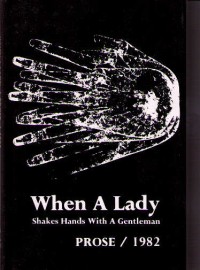 |
When a Lady Shakes Hands With a Gentleman
by Nikolai Bokov, Mark Insingel, Gertrud Leutenegger, Claude Ollier
Red Dust Books, 1982
96 pages / $8.95 buy from Amazon
|
1. Throughout the course of When a Lady, a very engaging 1982 collection from Red Dust, Inc, the contributors display a rigorous commitment to the avant-garde tradition of de-automatizing perception, as outlined by Shklovsky, and broken down like a boss here by A.D. Jameson
2. The Belgian novelist/ Concretist poet Mark Insingel reworks aphorisms and banal lanuage tropes.
3. “When a lady shakes hands with a gentleman (plucks out a gentleman’s eye) she does not remove her glove.”
4.
5. “How can the drop that made the cup run over be the same as the drop to which the cup is drained? (How can the drop to which the cup is drained be the same as the drop that made the cup run over?)”
6. “A Loves B who loves C who is adored by D, the only concern of E who wants to get rid of F who is courted by G who receives attentions from H, the idol of I who would be content with J who cannot leave K in peace who will not part from L who would prefer to go to M who has gone off with N who cannot forget O who would like to go back to P who has an eye on Q who would gladly be wooed by R who is making advances to S who is only interested in T who likes U, U need not despair at any rate (V, W, X,Y,Z).”
7.
8. Insingel looks for entrenched meanings and potentialities. He is repetitive, and redundant, and often very funny. The big blocks of mutable text ultimately represent his project, a sort of frustrated response and working with and through degraded language.
9. “Rare is beautiful/Rare is wonderful/Rare is awful./Rare is horrible./Rare is incomprehensible./Rare is possible./ Rare is deniable./ (You don’t have to accept it as true, you are not obliged to see it (it isn’t being thrown into our teeth), you need not have anything to do with it (go into it) it can’t frighten you at all (the chances are much too small), you can dream about it (wet dreams—nightmares), you can actually have a cozy chat about it.)”
10. Claude Ollier, explores sensations connected with memory images. In his project he interrogates some of the “word as signifier” aspects of language, dwelling on strange associations and essentially personal multiplicities in words.
July 17th, 2014 / 12:00 pm
25 Points: Even Though I Don’t Miss You
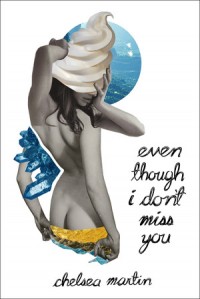 |
Even Though I Don’t Miss You
by Chelsea Martin
Short Flight/Long Drive Books, 2013
|
1. In this book, Chelsea Martin reminds me of my girlfriend. She reminds of all my ex-girlfriends, she reminds me of everybody’s girlfriend. It’s hard to pinpoint why. Is she the essence of contemporary girlfriendness?
2. It provides an insight sometimes into particular shades of emotion that I don’t necessarily seem to understand (not that I want to get all ‘Men are from Mars, etc ’ or some such popular-silliness about this point).
3. Other times, it’s nice to know that I’m not entirely wrong in my assumptions about ‘What might be wrong?’, ‘When something might be wrong?’
4. I have to declare an interest and that is that I’m not really in a relationship with Chelsea Martin but this book feels so much like being in a relationship as much from a male as from a female perspective that I can’t help but think that I am and that this qualifies it as a great success in that department.
5. “There is a piece of clothing thrown on the floor in the shape of what I look like to myself”. This is a beautiful, economical image; an everyday occurrence raised to something just v profound. I imagine it to be a denim skirt for some reason.
6. It reminds me of a line from an e-book, by someone, an old free e-book by someone, possibly Richard Brammer that I can’t find at the moment (maybe I imagined it) about ‘Your bra will fade on the radiator just like the rest.’ Any ideas?
7. The sentence that many reviewers have picked from this book is worth repeating in full:
“Being in a relationship for a very long time feels just like being single except that I can’t remember the last time that I was alone for five hours.”
This has the same periphrastic quality as that which I discussed in relation to Spencer Madsen (elsewhere in a 25 Points Review for HTMLGIANT). It’s almost like a really good, lengthy title appended to a very successful piece of conceptual art. I can see why so many reviewers chose to pick it out.
8. The relationship theme is undercut throughout with the many conversations between the ‘I’ and the ‘You.’ Often humorous, sometimes sad, occasionally refreshingly absurd, like a transcription of direct speech really is. See – this is what I meant in points 1-4.
9. Again, and in relation to a Spencer Madsen review that I have just written and so which is fresh in my mind but which might as well be seen as a recurring theme, a necessarily recurring theme, of all contemporary literature, that of the wide-open spaces of potential for metaphor, analogy, etc., when it comes to everyday technological digital life, a relatively fresh opportunity ripe for figuration, Chelsea’s line: “I feel like everything I write could be mistaken for theory about Adobe Photoshop’s Clone Stamp Tool” takes some beating. Apologies, that was an awful sentence, I wrote it backwards.
10. I don’t think I’m going to apologise for mentioned other writers in these reviews. Everything has a context, right.
July 15th, 2014 / 1:50 pm
A Review of Vulnerability on Trisha Low’s The Compleat Purge
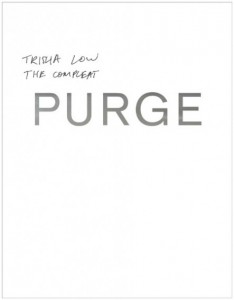 The Compleat Purge
The Compleat Purge
by Trisha Low
Kenning Editions, 2013
240 pages / $15.95 Buy from Kenning Editions or Amazon
I listen to NPR’s Morning Edition on Verdi’s 200th birthday. Soprano Sondra Radvanovsky says she loves Verdi’s operas: “People can relate, and say ‘Wow! I’m not the only person who fell in love with the wrong person,’ or ‘Oh gosh, I’m not the only person who made the wrong choice.’ Verdi makes people realize it’s OK to be human.”
This “realization” is the purge. Finger down the throat, razor from the drawer, opera on the stage. Purge. It’s OK to be human.
Trisha Low’s The Compleat Purge: a purge in three acts.
*
Act I: Low writes her last will and testament, turns a legal formality candid, into “gushy epistolaries” at age 6, then 13, 15, 17, 19, 20, 21, 23, 24. Suicide notes to her parents, to first loves, old friends, new friends, apologizing, professing undying love, willing Hitchcock DVDs, quoting from Murakami and Batman.
Low’s suicide notes are not gateways to reading her work, they’re the work itself. She’s keenly aware of Plath, Sexton, and Woolf. With Low brushing off the coup de grâce, the letters refuse ‘authentic’ truth.
Vulnerability as “elaborate conceptual joke.”
In an interview, Low quotes Joseph Kaplan: “I am interested only in the successful, annihilative manifestation of the poem, as an absolute violence.”
In John Cassavetes’ film Faces, characters pulse through impromptu sing-a-longs, threats, slaps, insults, a buzz of reverie and devastation. Overcome after cheating on her husband with the young playboy Chet, Maria downs a handful of sleeping pills. Chet finds her on the floor, tosses her in the shower, sticks his fingers down her throat, anything to wake her up, slaps her until she cries herself awake. Moment of calm. Chet lights a cigarette for her, leans back on the bed. “Nobody cares. Nobody has the time to be vulnerable to each other.”
Vulnerability as violence.
July 14th, 2014 / 10:00 am
The No World Concerto by A.G. Porta
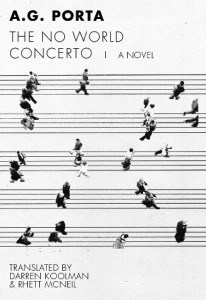 The No World Concerto
The No World Concerto
by A.G. Porta
Translated by Darren Koolman
Dalkey Archive (Spanish Literature Series), 2013
339 pages / $16 Buy from Dalkey Archive
I’ve been getting over this cold for about ten days now, and last week I had an especially bad night. I had taken 10mil of tussin pretty late, and now I realize the medicine was keeping me awake. At one point in the night my left leg lost circulation, and when I woke up, I thought, “Oh great, now that leg is entering the No World.” And as I slept, waking every hour or so, I had this creeping fear that more of me would fall into the No World. A terrifying prospect to be sure.
For A.G. Porta, the No World isn’t Bizarro World, but the subliminal articulated in a language we can’t understand. In The No World Concerto, out now from Dalkey Archive, A.G. Porta considers the limited tools we have for approaching reality and the so-called subliminal.
Like Cortázar’s 62 a Model Kit, The No World Concerto takes place in an unnamed city “the neighboring country’s capital” aka Paris. A “Screenwriter” obsessively writes a script that follows his relationship with a young piano prodigy, “the girl,” herself writing a sci-fi novelized account of their affair. The plot of The No World Concerto, comes across as somewhere inside and outside of all of these texts.
 The girl’s novel follows the story of an aging Alien-hunter.
The girl’s novel follows the story of an aging Alien-hunter.
Early on in The No World Concerto, the girl outlines her relationship to the No World:
I hear voices, the girl confesses. I think they come from another world. The young conductor asks her how she can be sure. How doesn’t she know the voices aren’t just inside her head? But she’s utterly convinced of it, and that should be proof enough it seems. The young conductor says no can know if something exists in and of itself outside the mind…They’re not even voices from this world, insists the girl, they’re from a false world, a No World created by some alien consciousness…(her novel) touches on this…the No World she writes and rewrites without ever getting anywhere; the No World that’s always expanding inside her, ever ripening, while never reaching maturity.
After co-writing a novel with Roberto Bolaño in the early 1980’s, Porta reportedly shut himself off from the world rereading Joyce and Wittgenstein. In No World, he lays the Wittgenstein on pretty early and pretty thick, highlighting the central paradox of the novel: Although our reality is bounded by language, language cannot describe all of reality.
Consider the joke: “Jean-Paul Sartre is sitting at a cafe. He says to the waitress, ‘I’d like a cup of coffee, please, with no cream.’ The waitress replies, I’m sorry, Monsieur, but we’re out of cream. How about with no milk?’”
For Porta, the act of literature is a negative act, naming thus negating imagined realities, because each “reality” corresponds with a multitude of unknown realities. Jacques Roubaud identifies this as the plurality of worlds. He says: (since I think/that the real/ is in no way real/how am I to believe/ that dreams are dreams)
So while the constant iteration of realities (via literature) might voice a critique towards a status quo, that critique will always be limited by the language we have. The infinite No-Worlds and Bizarro Worlds and alternate realities, (Crises on Infinite Earths, etc) of this world and reality are not really positive (or negative) mirrors, but rather frustrated slidings along an unknown continuum. Blanchot identifies this as the lot of author’s struggling away at a “work,” somehow existent, although ephemeral. Knowing that the transfer of this “work” from the subliminal kills it, and that the true triumph of literature comes somewhere in it’s ability to hold up the shortcomings of language.
While this might sound a little overwrought, Porta has a very light touch. And The No World Concerto is funny and enormously readable. Outside of her novel, “the girl” flirts with New Music stardom, adopting a John Cage-like rejection of rigid serialism in favor of indeterminancy.
Her Little Sinfonietta group performs a piece very reminiscent of The Green Table by Kurt Jooss.
By the third act, the “Screenwriter” sinks into mad-monk schizophrenia, and the action culminates in a very Robbe-Grillet-esque shocker. Although hailed in Spain as “one of the top ten Spanish-Language novels of the decade,” The No World Concerto resists simple interpretation, as it interrogates literature and compulsion in the modern world.
***
Joseph Houlihan lives and writes in Minneapolis, MN.
July 11th, 2014 / 10:00 am
Addicts & Basements by Robert Vaughan
 Addicts & Basements
Addicts & Basements
by Robert Vaughan
Civil Coping Mechanisms, February 2014
142 pages / $13.95 Buy from Amazon
While waiting for clothes to dry in a dingy, low-maintenance laundromat—leaning beside an out-of-service soda machine was a discolored Fisher-Price Playset (in case anyone wanted to conveniently scare/scar the hell out of their kids)—I tore into Addicts & Basements, Robert Vaughan’s slim collection of brisk, tightly-constructed miracles of human endurance both humorous and sad (often beautiful), as coin machines, some entirely gutted, struggled haphazardly against insurmountable odds:
A man is mailed his ex’s pubic hair; a lonely waitress perusing personal ads becomes smitten by Bondage Man; a father kidnaps two siblings who may or may not be his kids; and a husband surfs porn sites while wearing his medicated wife’s panties.
Vaughan’s talent in handling the plights of characters many would write off as pathetic grotesques is masterful, and he does it with love and sincerity:
He decided to give it a whirl in the toilets of Grand Central Station. He stopped by Wigs and Plus on 14th Street where the owner, Sunny, would sell him a cheap piece “for his mother.” Then he’d prop himself in the furthest stall from the door every Sunday morning. Wig in place. Like a parishioner. Or a TV evangelist. Or a congressman.
When it comes to flash fiction (those brief, punchy, not-quite-prose-poems) Vaughan is an upper-level video game boss. “Gauze, A Medical Dressing, A Scrim,” with its impeccable comedic timing, might be one of the best I’ve ever read. “Neighbors,” about two suspicious pet owners, isn’t too shabby either:
He likes her smile, imagines seeing those guinea pigs ripped into shreds. He untangles the leash. “C’mon, boys.” He imagines what she looks like covered in whipped cream. Even her heels. They keep laughing.
“On the Wings of a Dove” turns the nightmare juice up to 11 with Vaughan’s haunting tribute to Matthew Wayne Shepard, a young man tortured and killed by homophobes in Wyoming:
his coma was so quiet,
one of the killers would
later say, you could almost
hear ice rattling down the canyon
July 11th, 2014 / 10:00 am
25 Points: You Can Make Anything Sad
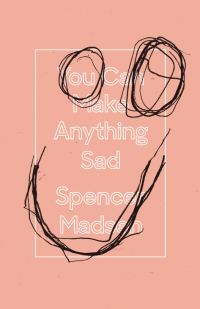 |
You Can Make Anything Sad
by Spencer Madsen
Publishing Genius Press, 2014
90 pages / $14.95 buy from PGP
|
1. Spencer Madsen’s new book has what you might call ‘a classic Alt-Lit title.’
2. Like many of his contemporaries, a fair proportion of this work is considering ‘What if…’ something happens and musing on ‘What ifs’ generally. I think this has something to do with the virtual world and what it has done to our brains. As a strategy it is, in itself, almost materially virtual.
3. There are many proper nouns. For me, proper nouns are essential.
4. Computer/technological device interface metaphors, analogies, etc., are a growth area to a large extent pioneered (as far as today’s technological landscape goes anyway) by Alt-Lit writers themselves. Madsen is very good at them. Here is one by him: ‘When you turn the screen brightness down on your computer, everything looks the same but seems a little shittier.’
5. On October 1st, 2012, Spencer encountered a man in a gym and mused on his ‘meaningless’ hairstyles, tattoos, and muscles (‘he does administrative work’) but notes that in a way this gym muscle man ‘is more authentic,’ ‘more purely veneer’ than your everyday person. This is deep, man! By which I mean that the way in which much Alt-Lit concerns itself with screens is down to the fact that screens, smoothness, etc., represent the spirit of our current age (and any age that we can imagine anytime soon on the, now non-existent, horizon) so it is important to face up to them, even if it means facing them to do so. This whole ‘life in front of small screens, large, intermediately sized screens’ is so ubiquitous it needs to be looked at. Alt-Lit does it very well, as does Spencer.
6. ‘A Tumblr called Girls Doing Things featuring photos of fully clothed girls doing normal things like standing in line at the post office or walking a dog’ would be the most genuinely erotic Tumblr of the year. Think about it, folks.
7. Nothing happens in this book in that way where everything happens or rather so many things happen that nothing seems to happen. Word thinks this is ‘verb confusion’ but it is really more about the state of things.
8. I say nothing happens but there is a half-hearted worry about coming to the end of a relationship which is recurrent but which isn’t foregrounded. Although coming to the end of a relationship is a big thing (like moving house, as they say, not enough novels about ‘moving house?’), it’s inevitable that something else will start.
9. Something else does start. He starts going out with someone new. It’s new; he likes it as we all like that kind of thing.
10. He’s good at the old poetic trick of mixing everyday concrete noun combinations like ‘cereal and milk’ with the slightly more amusing concrete noun ‘ice cream’ with a sudden abstract noun ‘emotional stability.’ This is an old trick that will never stop working. He executes it very well. I laughed.
July 10th, 2014 / 12:00 pm
A Sloth’s Perspective
Beach Sloth, cult blogger-extraordinaire, is arguably one of the few things you should actually pay attention to on the Internet. A magnificent poet and semi-anonymous (though some know his secret identity), Beach Sloth is the spirit of discovering new art—plucking it from the depths of the Internet and hidden crevices of the unknown in effort to make us aware. The style of his reviews are poetically analytic and hit off on major points of each work he’s featuring. He covers a wide variety of literature, art, film, music, online activity of Internet poets, and other mediums that peak his interest. Beach Sloth wants to make his art into a money making enterprise. He wants to extend his three fingered claws and touch everyone with his work and insight. You can paypal him at: pleasepaybeachsloth@gmail.com. He tweets at @Beach_Sloth. He also allows you to advertise on his blog. (There’s nothing this sloth can’t do.)
I interviewed Beach Sloth over a course of a week through email about his project, the artistic “struggle”, and his views on indie lit. Being a prominent player in the “alt lit” scene, the blogger’s responses were eye opening and unique to his own. So kick back, relax, and enjoy this sloth’s perspective.

What is Beach Sloth? Why was this alias created? What is your slothy purpose?
Beach Sloth is my way of interpreting the culture I see created online every single day.
I created Beach Sloth after a series of really strange events began to happen in my life. None of them were bad but I was feeling a little bit too comfortable with the daily routines I was going through. Hence Beach Sloth kind of served as a challenge to me to engage more with the world (and Beach Sloth as a project continues to challenge me with a near-endless stream of work).
My purpose is to support others and have others support each other. If that happens I am happy.
How satisfied are you with your work thus far? What would make it better? What would make it worse?
I am pretty happy with my work thus far. I think I am moving in the right direction and I am constantly trying to improve what I do. Some of the work I did in the past seems a bit ‘underdone’ compared to what I do now, in that I am a lot more focused on keeping things concise and edit a lot harder.
My work probably would be better if I ventured outside of my immediate social media realm. One of my goals for Beach Sloth in 2014 is to try and expand my horizons outside of the blog. This has meant a chapbook for Peanut Gallery Press, more submissions elsewhere (I’m bad with submissions in general) and trying to move into more visual work (I want to do a better job of taking advantage of Tumblr’s focus on the visual, something I know I haven’t done enough of in the past).
Honestly I am pretty hard pressed to think what would make it worse. Probably the worst thing I could do would be to sort of shut off Beach Sloth to a few specific writers. I try to keep up a variety of coverage so people do not see the same names all the time. My focus is also on those whose work I particularly enjoy and people who I think deserve more credit. READ MORE >
This Isn’t a Room to Rest In: A Review of Brett Fletcher Lauer’s A Hotel in Belgium
 A Hotel in Belgium
A Hotel in Belgium
by Brett Fletcher Lauer
Four Way Books, March 2014
116 pages / $15.95 Buy from Amazon or Four Way Books
Brett Fletcher Lauer’s debut collection, A Hotel in Belgium, resists. The poems resist narrative as often as they sneak over towards it, snag some, and then move back over the boundary—however arbitrary and fleeting that boundary might be—into a lyric. The poems challenge the reader to follow along with the narrative and/or lyric and then, just like a magician snapping her fingers to get you to look that way, the logic falls apart, falls inward, collapses, rearranges itself in the cavern it fell into, and then shouts back up to you on the surface, saying, “See? See? Didn’t I tell you there was a hole here all along?”
That sense of resistance also becomes a venue for doubling, so that, one thing becomes two, becomes multifaceted, not because everything necessarily exists in a state of constant change, but because the speaker exists in a state of constant change, so his view, his language, reflects that:
In the beginning, my eyes were angled
out a window on a point providing
conclusion while periodic vibrations
of fear aggressively governed
my anatomy. There were others
kept ignorant of the latitude of this
municipality, the river’s proper name,and its source in a local mountain.
It’s important this isn’t construed as
a sales pitch, just a sensible presentation
of the future, sealed as its caskets
like some distant city encircled by
horned predators. Don’t wish the dead
are not. They are.— from “Stockholm Syndrome”
Even the opening epigraph from Goethe delivers this sensation of a doubling and of a resistance: “It is as if a curtain had been drawn from before my soul, and this scene of infinite life had been transformed before my eyes into the abyss of the grave, forever open wide.” It is this uncovering, this unveiling, that alters the view: from infinite life to an abyss of the grave, both existing “forever open wide,” but, in one instance, a peaceful, joyous experience, and in the other, a darker existential reality. The action, though, remains a singular event. It is our interpretation of that action, our view that alters the thing looked at.
Beyond the poems’ resistance to fitting into a binary, the reading of the poems—the syntax and sentence structure, the rhetoric—resists a single, easy read. These are poems we must return to, that we want to return to, so that we can get a better grasp of this poet’s mind. And after reading the book a handful of times, I’ve come to no conclusions on these poems, because the poems don’t conclude their thoughts. There is no resounding, final chord, no final return, no abiding image. Instead, they resonate. They trail off. They get somewhat lost because, the poems suggest, getting lost is a legitimate reaction to the world these poems present and occupy.
Our situation is complicated, full of negations
and negations of negations. To rememberexperience rather than what’s occurring—
this detachment replaced with strangersother strangers recognize.
— from “In a Station of the Metro”
Occasionally, a line arrests us in these poems with its desire to connect with the reader (“Don’t cry. I am touching//your shoulder.”) More often than not, though, the speaker’s sense of confusion returns—which we share as the reader—so, yes, we receive a Frostian momentary stay against the confusion the speaker feels, but, just as soon as we feel that, we’re tossed back into the mix, back into the rubble of ideas, logic and concerns that determine the course of the speaker’s life.
July 7th, 2014 / 10:00 am
Tombo by W.S. Di Piero
 Tombo
Tombo
by W.S. Di Piero
McSweeney’s Books, 2014
65 pages / $15 Buy from McSweeney’s
Tombo is a book about place as much as anything. It’s about San Francisco. Many poems are about place – whether they are explicit about it or not. Di Piero is explicit in Tombo. W.S. Di Piero recently won the Ruth Lilley Poetry Prize, a Guggenheim Fellowship, a National Endowment for the Arts Grant, the Lila Wallace-Readers Digest Award, and writes for the New York Times, among other places. He is an incredibly distinguished poet and McSweeney’s bills him as “a master of the adjective, a master of sound and story.”
I’d never read anything by W.S. Di Piero before this book, which I read primarily at cafes not in San Francisco. Di Piero starts the book by addressing, you, the reader, “Life, as you say, my friend, / is lived in its transitions.” Life is funny like that. The first poem, The Running Dog, involves a brunch I could envy “A breakfast of poached eggs, / spiked coffee, newsy talk, / crushed sun behind the clouds, / marine layer vapors phasing / blue to green, and the body / quivers through its days.” In fact, like living in San Francisco and eating brunch, there’s a lot about the life of the poet that seems enviable, depending on your disposition.
I would highly recommend this book if you appreciate poemy poems full of foghorns, flowers, and random interjections in other languages. Di Piero prides himself on sound and music, and there is a certain music in these poems – while they’re unrhymed free verse, there’s a recognizable rhythm and music throughout.
The poem Sleeping Potions reminds me of a story I heard from a local bike mechanic: A man came into his bike shop, and took a used bike out for a test-ride. The man never came back. He had left his bag with a laptop, credit cards, wallet, and other valuable things, at the bike shop as collateral / insurance. A few days later the bike shop gets a call. The police had found the man “several hundred miles” north of the bike shop – he had no explanation for what he had done – he didn’t know or remember the previous several days. The bike was returned to the shop and the man got his bag and valuables back. But what happened between the shop and hundreds of miles north?
And what’s happened in Tombo during the intervening fugue paragraph? We’ve moved from Hayes Street, to Duboce Triangle, to the N-Judah. We’ve got a look at Market and the Mission and Dolores Park. Di Piero has said that his books “start out as miscellanies.” The poems in Tombo don’t have the kind of narrative arc or grand teleological direction. They’re brief meditations. “If my poems come out right, they tell what it feels like to live in a world of troubled relatedness,” Di Piero said in an interview. I like this idea of troubled relatedness – and I think it’s an interesting way to talk about poems.
July 7th, 2014 / 10:00 am
Death Centos by Diana Arterian
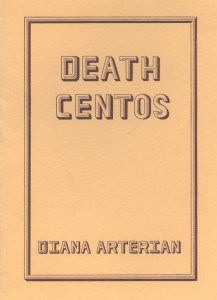 Death Centos
Death Centos
by Diana Arterian
Ugly Duckling Presse, 2013
24 pages / UDP Page
When my 12 year old daughter rolls her eyes at me, I tell her stop it. I say, stop it. You shouldn’t treat me like that. I’m going to die someday.
She says, Mom, I know.
My husband says, Both of you, stop it.
But I can’t. I can’t stop. So I tell her, we’ll be dead forever. Just think about that: forever. Infinity. All of time. And we are only alive for a little second of it, and we barely even get to know each other, and you want to waste the little time we do have being alive rolling your eyes at me.
My husband says, Please, Sara. Not this shit again. Don’t say that.
Jeez, Mom. Seriously. I know we’re going to die.
But you don’t get that it is really soon. I could die tomorrow. So could you.
My husband says, Stop. No more. Stop saying that shit tonight. Just not tonight. Let’s just watch a show together, and enjoy our evening. Please, he implores, not tonight. No death stuff tonight.
The book of poems, Death Centos, by Diana Arterian is a book of poetry made by collage and with constraint. Arterian has created a mixed tape of famous figures’ final words. Her poems pull the final phrases of famous persons from their resting places of mythology and arranges these phrases into poems. Death Centos, conceptual in conceit or not, is a book of poems that is rich and profound. The author doesn’t seem as displaced as in most pieces of conceptual writing. This contributes to a feeling of stability within the text. The poems are full of hearty material. The words are the actual final words of folks before death. Most of the folks quoted carry some importance in the trajectory of civilization. These words lend to the power of the poems, but that isn’t the whole story. The arrangement of the words is of paramount importance. I am not a poet. And because of this I can consume poetry in a way that allows my mind to form ideas from the poem, or access to the subtext in a way that feels more mystical than an outright technical analysis would. I’m talking about feelings here. I feel that the work is good. I feel the poems are strong. I felt stirred by them, and provoked. I take this to mean that art is working.
In the first poem “I” in the section LAST WORDS OF THE DYING there is a list at the side of the page highlighting the people whose words have been arranged in the poem: Ludwig van Beethoven, Frederic Chopin, Thomas Edison, Franz Ferdinand, Johann Wolfgang von Goethe, Victor Hugo, Timothy Leary, Wolfgang Amadeus Mozart, Theodore Roosevelt, Tom Simpson, Rudolph Valentino. There are only ten stanzas in the poem and the punctuation defies orderliness. There are no clues here, just a list of contributors. From the first I realized there would be no real correlation between the order of the contributors, and the poems’ inclusion— or, if there was, it would be more work than any book of poetry should be. I found myself wanting the poem to align with list of personas so that I could figure out who said what at the end of his life, but Arterian wasn’t going to let that happen.
Perhaps this description of my experience with this conceptual piece of work seems pedestrian to you. I think though, that my experience is worth talking about. For so long I felt shut out of conceptual work. That is a huge part of the culture to miss out on. Conceptual projects and poems intimidate cultural consumers. MFA programs like the one I went to are rife with what could be either interesting experiments or half-hearted attempts at grabbing some attention. You have to get close to tell the difference. Only now, years after school, do I find myself brave enough to get close, to engage, and to speak about the work. However, by no means am I an expert. I am a dilettante.
Arterian’s first poem taught me how to read the rest. It taught me what to do from the first. I think this says something about the accessibility of her work. About the potential appeal. Not everyone is going to care about poetry, but everyone should feel welcome to engage. I think that the content of Death Centos is inviting. Macabre, yes, but death is coming. To each of us. And “this is the fight of day/and night.” This is a space of common ground. This is a book of inclusiveness. This is a book of successful appropriation where the original text adds up to so much more than any of the snippets.
Each of the poems begs to re-read. There is a smoothness despite the punctuation. The poems flow and drip. Arterian is a master at moving you down through poem at a steady pace. In the poem “V” in the first section of LAST WORDS OF THE DYING three names are listed down the side: Warren G. Harding, Frida Kahlo, Martin Luther King Jr. I read the poem “V” three times in each voice, letting each one of these famous persons own the words of the others in a vision of their respective deaths.
Make sure you play “Precious Lord”
tonight—play itreal pretty. That’s good.
I hope the exit is joyfuland I hope to never
July 4th, 2014 / 10:00 am
